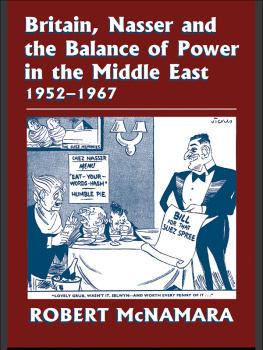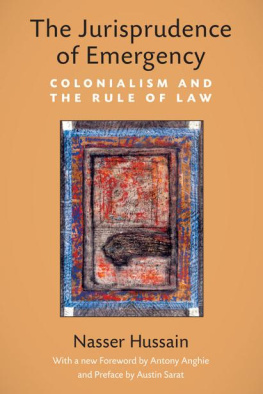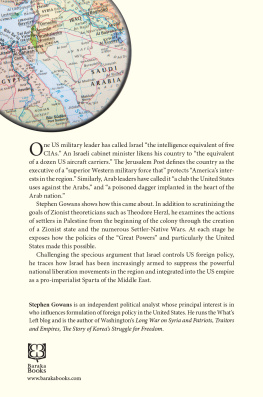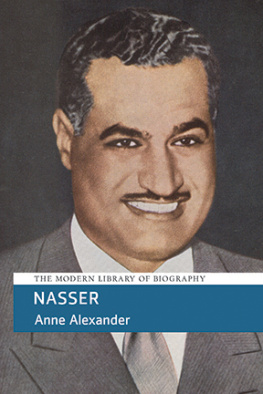
The author and publisher have provided this e-book to you for your personal use only. You may not make this e-book publicly available in any way. Copyright infringement is against the law. If you believe the copy of this e-book you are reading infringes on the authors copyright, please notify the publisher at: us.macmillanusa.com/piracy.
Contents
To another Arab, my friend Abdul Bari Attwan.
To Linda with love.
ACKNOWLEDGMENTS
No list of the people who helped me research and write Nasser: The Last Arab is provided. I owe a huge debt of thanks to all of them. However, the opinions expressed in the book, like its shortcomings, are mine alone.
INTRODUCTION
The Painful Truth
Gamal Abdel Nasser, universally known by his last name, was the towering Arab leader of the twentieth century. A pro-West Egyptian army colonel who assumed power in 1952 with the knowledge of the CIA, Nasser later became the embodiment of the historical confrontation between the Arabs and the West.
What separated Nasser from Arab leaders of his time is still with us today. The others depended on Western support and ignored their people. But the voices of the people seemed to reside within Nassers person. His inability to reconcile his responsibility to his people with his natural pro-West inclinations was his undoing.
A similar conflict has faced the traditional Arab leaders since September 11, 2001, and President George W. Bushs demand of unqualified adherence to his new policy, the war on terror. Either you are with us or you are against us, announced the president, without considering the delicate position of Americas Arab friends in the Middle East. Because their people dislike the United States, especially its pro-Israeli policy, it is impossible for Arab leaders to openly support Washington against fellow Muslims, even Muslim terrorists. Caught unexpectedly in a no-win situation, the leaders of Egypt, Saudi Arabia, Jordan, and other pro-West countries were exposed and without protection. Other than declaring war against Israel in 1948, the pro-West Arab leaders had never had to disagree with their protectors so openly.
In fact, President George W. Bush wasnt asking for anything new. Telling Arab leaders what to do has been the norm for Western governments since the First World War. Both accepted the idea of Western dominance, which allowed Arab leaders to dismiss the aspirations of their own people and become dictators. This is the background to the political, cultural, and spiritual decline that has afflicted the Arab Middle East for more than eighty years. The decline followed Britains and Frances creation of fourteen countries made up of chunks of real estate that lacked religious, ethnic, and linguistic cohesion. The new countriesSyria, Iraq, Lebanon, Jordan, Palestine, Kuwait, Saudi Arabia, Bahrain, Qatar, the United Arab Emirates, Oman, Yemen, Egypt, and the Sudanwere placed under sheikhs, emirs, and kings in accordance with colonial interests. The Arab people tried their utmost to change this situation. Decades of turmoil followed as they expressed their rejection of the new Arab rulers and their sponsors. But, judged by the lack of results, the various rebellions and coups produced, and the continuing dominance of unpopular pro-Western leaders, the Arab people have not succeeded in liberating themselves. More important, the majority of the Arabs are no longer trying to create a democratic political process in their countries, while small groups are now resorting to violence.
Todays Arab leadersFahd of Saudi Arabia, Mubarak of Egypt, Abdullah of Jordan, and the heads of the tiny Gulf stateletsare more dependent on the United States and its system of using them as deputy sheriffs to control the oil-rich region than their predecessors were on the British and French, who were behind the creation of this system early in the twentieth century. The British and French showed a minimal basic concern for the Arab people and things were easier in the 1930s, 1940s, and 1950s, but this is no more. When the United States assumed the role of the major power in the region, it not only extended the original system, it exercised tighter indirect control and retarded any chance of introducing democracy. Despite attempts to blame some Arab countries without examining Americas role, what the September 11 terrorist attacks provedthat the arrangement fell short of representing a working systemis what we are facing today.
The only way to judge this or other theories that purport to explain the decline of the Arab Middle East to its present sorry state is to examine the records of the Arab leaders of the twentieth century. Whether in a modern or a traditional mold, the dictators behavior represents a visible and consistent pattern. Moreover, it is axiomatic that dictatorships leave us with no institutions to examine; the cult of personality created by dictators excludes the development of durable political organizations. Writing a book about Arab parliaments would be tantamount to playing trick or treat; they existed only briefly and were created by leaders who did not believe in democracy. In fact, not a single one of these leaders has left behind any institution of lasting value. Even the legendary unifier of the Arabian Peninsula, Ibn Saud of Saudi Arabia, left us with nothing but a family of awesome statistical proportions. The House of Saud fails to qualify as an institution, unless perpetuating despotism is elevated to an accepted form of continuity. So the absence of institutions places the Arab leaders in the unique position of being the sole representatives of their time.
In writing a political biography of Nasser, I am continuing to examine the history of the Arab Middle East in the twentieth century through the lives of its leaders. I began with the House of Saud; The Rise, Corruption, and Coming Fall of the House of Saud showed that the dynastys mere presence represents an impediment to progress, or even the potential for progress. I followed up by examining the Hashemites of Jordan (and until 1958 of Iraq as well) in A Brutal Friendship: The West and the Arab Elite . The Hashemites had, and have, Made in the West stamped on their rule. Left with only poor Jordan, they continue to depend on outside powers to survive. After that came my biography of Arafat (Arafat: From Defender to Dictator) , a study of the betrayal of an Arab peoplethe Palestiniansby a popularly chosen leader who eventually emulated the traditional ones and placed his responsibility to the powerful West ahead of that to his people. And the latest effort was a biography of Saddam Hussein (Saddam Hussein: The Politics of Revenge) , an examination of tribal megalomania using modern methodsand why the West supported and used Saddam and then opposed him. Western support for Saddam depended on his usefulness, as when he invaded Iran and, with substantial support from the West, interrupted Khomeinis plans to convert and control the Middle East.
Naturally, all the Arab governments of the Middle East came out against my efforts. Two resorted to physical threats, then gave up when the threats didnt work. One offered a substantial bribe, which I turned down. When these traditional methods didnt work, I was subjected to a campaign of slander in which Western news correspondents and former diplomats participated. Many establishment Arabs who live off corrupt Arab regimes accused me of being in the pay of the Israelis. The United States and British governments made their displeasure known. At one point it became difficult for me to make a living.
The case for writing a biography of Nasser is clear. Thirty-two years after his death, the man who waged war against political Islam needs to be studied. The Arabs of the street and souk, those who supported Nasser while he was alive, have now turned to Muslim fundamentalism. It was Nasser who saw the Islamic danger first and never wavered in his opposition to Islam as an instrument of governance. This and other factors tell a great deal about how and how much the Arab Middle East has changed since his death.
Next page










